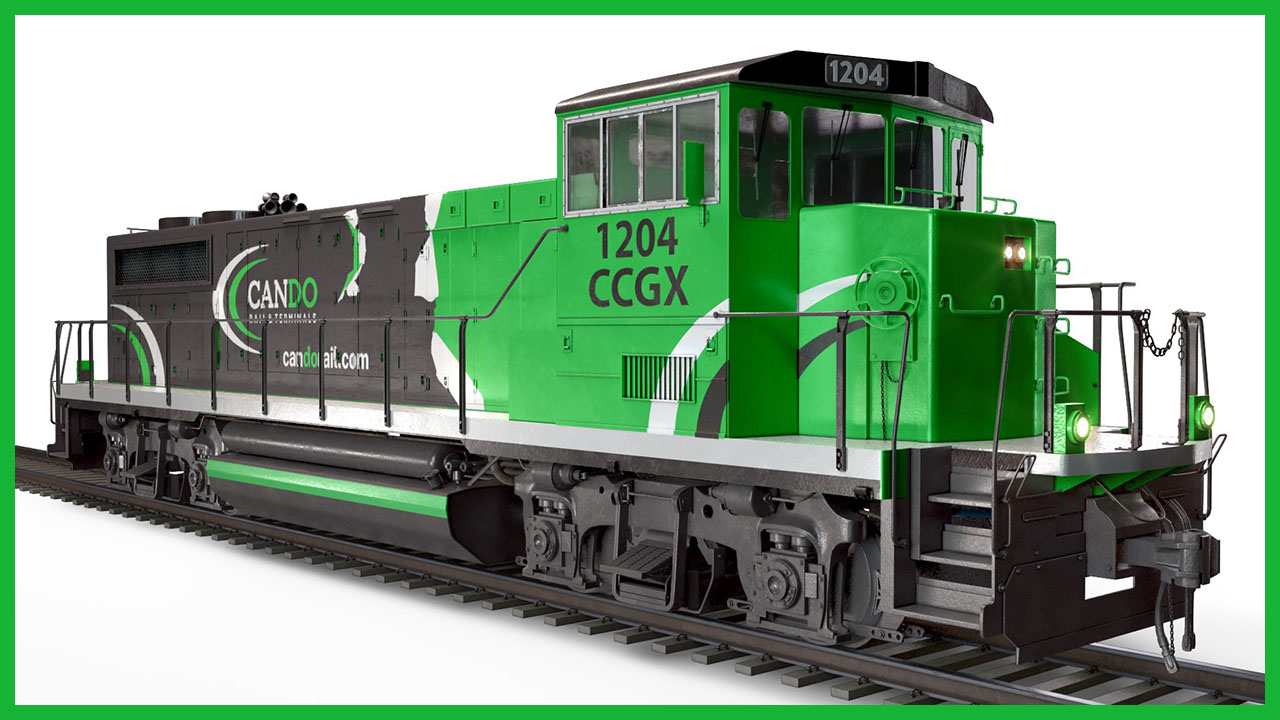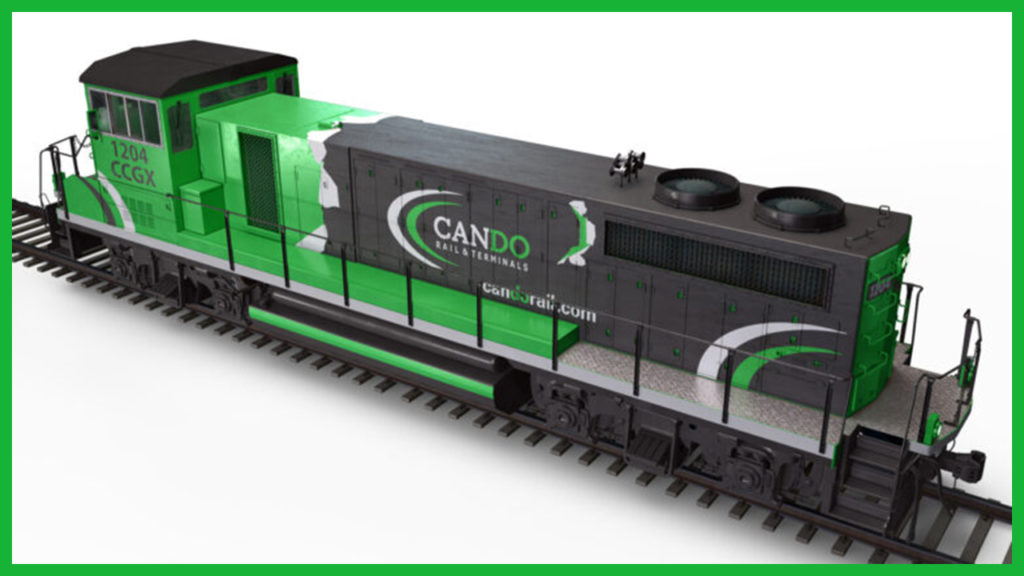
Cando Rail & Terminals Jump-Starts Battery Loco Project
Written by William C. Vantuono, Editor-in-Chief
Cando Rail & Terminals Li-Ion battery-electric switcher locomotive
Alberta-based Cando Rail & Terminals is developing a battery-electric switching locomotive through its Li-Ion (Lithium-Ion) 2025 Project, which involves retrofitting a legacy, non-tier-compliant diesel-electric locomotive with a lithium-ion battery propulsion system. The locomotive will be a scalable solution customized for the company’s In Yard Operations (IYO) or closed loop switching operations.
The Government of Alberta is contributing $2 million of the project’s estimated $4 million cost through the Emissions Reduction Alberta (ERA) Industrial Transformation Challenge. Projects were selected through ERA’s competitive review process. “A team of experts in science, engineering, business development, commercialization, financing and greenhouse gas quantification conducted an independent, rigorous, transparent review and ERA’s Board of Directors made the final funding decision based on the recommendation of these experts,” Cando said.
Once the retrofit is complete, Cando will demonstrate and evaluate the locomotive’s technical performance and supporting charging infrastructure in switching operation in the Fort Saskatchewan, Alberta area. The schedule:
- October 2023: Finalize Li-Ion system, charging requirements and source material.
- March 2024-September 2024: Retrofit locomotive/commissioning.
- October 2024-December 2025: Field testing.
The project “will help Cando and its customers with their greenhouse gas emissions and sustainability goals,” the company noted. “The locomotive we’re developing will be completely scalable and custom made specifically for our IYO and is expected to reduce energy consumption by 40% vs. traditional locomotives.”
Cando noted it has selected nickel manganese cobalt (NMC) batteries “due to their unique characteristics. Although this style of battery has a lower energy density compared to other lithium-ion batteries, they provide many advantages over more energy-intense battery chemistries. These advantages include thermal runaway protection, packaging that prevents self-ignition, and firefighting measures that can be accomplished using standard Class ABC extinguishers. The selected batteries also mitigate the need for specialized training, equipment or additional measures to protect operators, first responders or the public in the event of a failure or fire.”
Cando added that the technology “is still under development and is not available in Canada at the current time. We are working with U.S.-based Innovative Rail Technologies (IRT), which is developing and retrofitting lithium-ion propulsion systems in the U.S. and is currently demonstrating one of the first commercially available switching locomotives there. We will continue to work with Canadian suppliers and innovators with the goal that our pilot project will position Alberta, and Canada, to become a leader in the technology.”
Cold-weather performance will be critical, Cando said. “Compensations for temperature and operating characteristics will be considered during design, testing, and will be actively monitored following deployment into the field,” the company said. “An unknown with lithium-ion propulsion in this application has been the transition into colder climates such as Edmonton, where our first field deployment will take place. However, we’ve already started working with IRT on designing thermal management systems that will keep the batteries within optimal temperature ranges. Consistent monitoring and evaluation of the locomotive control systems and onboard batteries will produce the performance necessary to execute service delivery for our customers. Cando is focused on environmental stewardship which includes reducing GHG emissions, but as a third-party contractor, we must also balance this with the needs of our customers. We believe that the implementation of lithium-ion technology will enable us to satisfy both objectives.”
“Government of Alberta funding through ERA is critical to help Cando Rail & Terminals develop a battery-powered locomotive customized for industrial switching operations,” said Steve Bromley, Chief Commercial Officer. “This industry-transforming initiative could dramatically reduce greenhouse gas emissions, helping rail service providers and industrial companies moving product by rail meet sustainability goals faster.”
Cando pointed to environmental benefits such as elimination of diesel fuel and exhaust emissions, reduction in lube oils and waste, and an estimated 40% reduction of energy needs. “Noise pollution will also be reduced along with the elimination of the locomotive exhaust system, which can potentially be a source of ignition for trackside fires,” the company said. “Traditional diesel-powered locomotives produce approximately 521 tons of CO2/year on average compared to a battery locomotive, which will produce zero tons at the point of consumption.
“As the locomotive will be deployed in Alberta, it is estimated that 51 tons of CO2/year of emissions will be produced to supply the locomotive with the electrical energy it requires. As cleaner electrical energy sources continue to be developed and deployed, and depending on where locomotives are deployed, the environmental impact will continue to decrease over time. This one-locomotive retrofit has a current emissions reduction of 470 tons of CO2 per switching locomotive. The project is expected to achieve project-level emission reductions of 3,300 tons CO2 by 2030 and 11,900 tons by 2050). The market-level emission reductions are estimated at 16,600 and 255,300 tons within Alberta, by 2030 and 2050, respectively. The market level forecast includes electrification of Cando’s existing locomotives in Alberta at an average of two conversions per year. Estimating the market potential only within the company’s operations provides the highest level of confidence in the market reduction, but results in a significantly conservative assessment.”
The project “will significantly lower not only Cando’s emissions, but will also significantly impact our customers’ Scope 1, 2 and 3 emissions reduction goals,” the company said. “Once we prove the technology in the field, the project will have converted one locomotive at one site. The target market for initial commercialization are Cando’s operations and existing customers that utilize switcher locomotives. We will work with our existing customers to determine if battery-powered locomotives are desired. Depending on the level of success and customer buy-in, we will create a pathway for commercialization beyond Cando and Alberta.”




